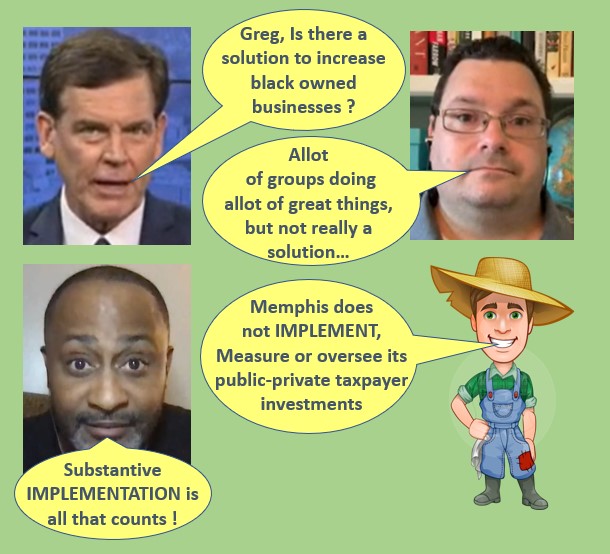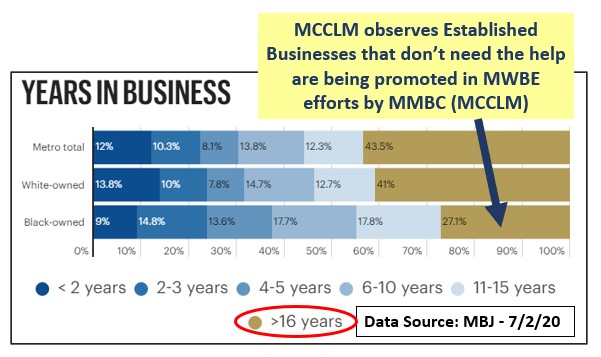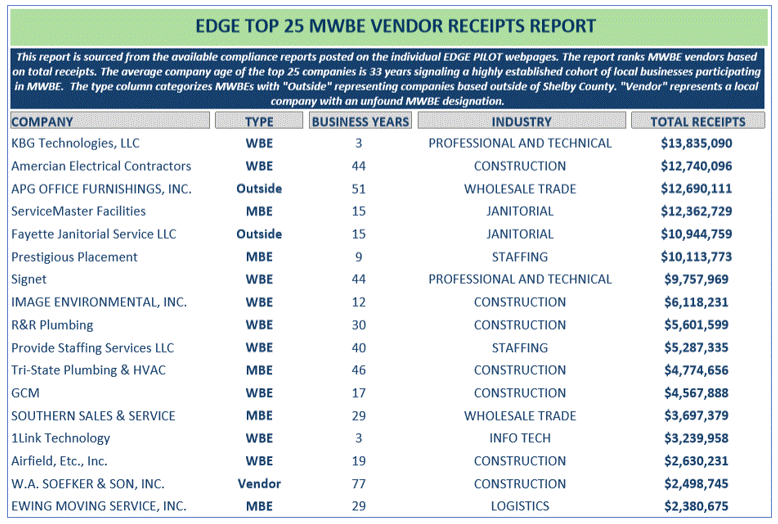In a Facebook Live video yesterday, Dr. Earle Fisher had it right. In summary, Fisher states that substantive implementation is all that counts. And local economic development implementation has not been happening. Fisher’s comments mostly had to do with police reform while he also mentioned minority contracting.
Meanwhile, today on WMC-TV 5 , Joe Birch was asking Greg Akers, of the Memphis Business Journal, (MBJ) if there is a solution for locally increasing black owned businesses. Akers answered with what is heard so often, that there are allot of great groups doing great things but really no specific solution.
While MBJ is teeing the subject matter up, no one is exploring why, over the years, local minority women business enterprise (MWBE) implementation has not achieved desired results. After all, MWBE has been around for years. Why not more progress ? No one is asking.
Through this blog and as a locally owned small business (LOSB), I have for years now been proposing, through a range of tools, better public measurement. But the elitist complex dismisses their own local businesses choosing instead to go out of town to the likes of Canada, Boston, and Idaho, while local economic and workforce development implementation suffers.
While leveraging MBJ data, this blog will explore why MWBE has not achieved meaningful results and proposes specific solutions going forward.
Why Not More Progress?
First, the reason for lacking progress with MWBE is due to, like so many other areas, absent public measurement and governmental oversight. Absent measurement stems from a racially diverse public-private complex that chooses not to measure or oversee the elitist Memphis Tomorrow complex.
At the last EDGE quarterly report, before the County Commission, legislators were given questions by the public regarding the Blues City PILOT award having less than 1% committed MWBE spend on a $50M project. But the question was never asked by Commissioners of EDGE. Instead, the EDGE quarterly report was rubber stamped as usual. No measurement + no oversight equals no substantive implementation.
Secondly, the area’s leading MWBE certification and connector, Mid-South Minority Business Continuum (MMBC), specializes in serving well established businesses with second layers of management and institutional processes. This would typically be longer standing businesses. See above graph with MCCLM additions to data sourced from MBJ.
In many ways, the Memphis MWBE leader, in the MMBC, connects established business, that don’t necessarily need the help, for business sustainability with local corporate contracts. See MMBC’s CEO, Jozelle Luster Booker, explain MMBC’s business model at 8:55 in the below video.
MMBC’s model appears to be working for established local businesses. These are the types of local businesses that local corporations would likely seek to work with anyway. This flawed economic development design, by default, dismisses bringing on line smaller in need businesses.
For example, with EDGE’s MWBE program, the average life span of the top 25 MWBE receipt recipients is 33 years (table below), signaling highly established businesses benefitting from MWBE. MWBE receipts are used, in part, to help justify excessive local corporate/real estate abatement awards.
Next, it appears that the local elites have hijacked local MWBE programming with Kathy Buckman Gibson’s KBG Technologies, being the #1 EDGE MWBE recipient, with $13M in receipts. Gibson also serves on the National Civil Rights Museum Board. Gibson doesn’t need the help.
And finally, there are a number of companies, based outside of Shelby County that have enjoyed significant MWBE receipts while receipts for women business enterprises have exploded. Black owned business receipt growth has, on the other hand, stagnated while LOSBs have barely participated in MWBE. See Complete MWBE Dashboard.
Conclusions and Solutions
For some time, Memphis’ chief economic development challenges have been small business and workforce development. With respect to MWBE programming, to support black business growth, these are some specific solutions:
Implement public measurement and rigorous governmental oversight to support increasing black owned and small business development.
Do away with MWBE programming to justify excessive tax abatement awards, preserving public funding for small business and workforce development investments.
Leverage the Federal Definition for Disadvantaged Business Enterprises for MWBE / LOSB participation where the business owner cannot have net worth that exceeds $1.32M.
In the end, substantive economic development implementation, away from runaway elitism, will be the only solution for public structural revenue problems and a majority black Memphis community in need….



